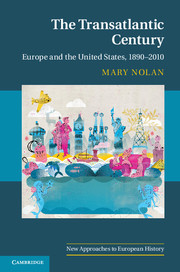Book contents
- Frontmatter
- Contents
- Illustrations
- Maps
- Tables
- Acknowledgments
- Introduction
- 1 An uncertain balance, 1890–1914
- 2 World War I: European crisis and American opportunity
- 3 Ambivalent engagement
- 4 The depression and transatlantic new deals
- 5 Strange affinities, new enemies
- 6 From world war to Cold War
- 7 Cooperation, competition, containment
- 8 Culture wars
- 9 The American Century erodes, 1968–1979
- 10 Renewed conflict and surprising collapse
- 11 A widening Atlantic
- 12 Imperial America, estranged Europe
- Suggested readings
- Index
- References
7 - Cooperation, competition, containment
Published online by Cambridge University Press: 05 November 2012
- Frontmatter
- Contents
- Illustrations
- Maps
- Tables
- Acknowledgments
- Introduction
- 1 An uncertain balance, 1890–1914
- 2 World War I: European crisis and American opportunity
- 3 Ambivalent engagement
- 4 The depression and transatlantic new deals
- 5 Strange affinities, new enemies
- 6 From world war to Cold War
- 7 Cooperation, competition, containment
- 8 Culture wars
- 9 The American Century erodes, 1968–1979
- 10 Renewed conflict and surprising collapse
- 11 A widening Atlantic
- 12 Imperial America, estranged Europe
- Suggested readings
- Index
- References
Summary
From the late 1940s on, the Cold War provided the geopolitical context and discursive framework for European-American relations; it shaped and warped transatlantic economic, political, and cultural interactions; it became a way of life. The Cold War was not synonymous with everything that happened, but virtually everything from the arms race and economic development at home and abroad to political debates and cultural exchanges was inflected by it. Europe was not the only arena in which Americans and Soviets confronted one another, but they did so there most directly and with the greatest ideological, military, and economic investment. The European Cold War was part of a Euro-American civil war that began with the Russian Revolution but had deeper roots in long-standing conflicts about political and social rights and competing visions of equality and justice.
The Cold War in Europe was a joint American and Soviet project, even though the United States was unquestionably the dominant power economically and militarily. Both states – or, more accurately, empires – promoted their ideologies, defended their real and imagined security interests, and pursued their economic goals. European states also shaped the Cold War as they pursued their own interests and criticized the actions and ideologies of the superpowers. And the Third World offered the United States, the USSR, and Western Europe a further arena for conflict and competition that also influenced transatlantic relations.
- Type
- Chapter
- Information
- The Transatlantic CenturyEurope and America, 1890–2010, pp. 191 - 229Publisher: Cambridge University PressPrint publication year: 2012



